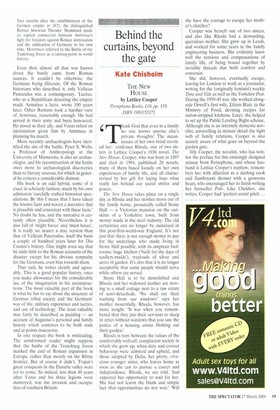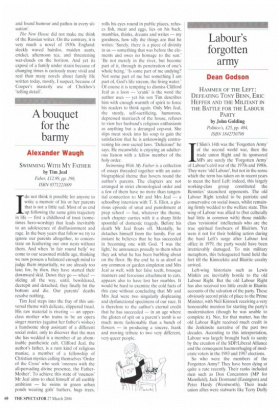Behind the curtains, beyond the gate
Kate Chisholm
THE NEW HOUSE by Lettice Cooper Persephone Books, £10, pp. 319, ISBN 1903155371 T
‘ hank God that even in a family no one knows anyone else's
nesses of her own mind revolted her,' confesses Rhoda, one of two sisters in Lettice Cooper's 1936 novel, The New House. Cooper, who was born in 1897 and died in 1994, published 20 novels, many of them based loosely on her own experiences of family life, and all characterised by her gift for laying bare what really lies behind our social smiles and graces.
The New House takes place on a single day as Rhoda and her mother move out of the family home, prosaically called Stone Hall — a Victorian mansion on the outskirts of a Yorkshire town, built from money made in the steel industry. The old certainties can no longer be sustained in this post-first-world-war England. It's not just that there is not enough money to pay for the underlings who made living in Stone Hall possible, with its umpteen bedrooms, huge kitchen (built for the days of scullery-maids), traytoads of silver and acres of garden. It's also that it is no longer acceptable that some people should serve while others are served.
Stone Halt is to be demolished and Rhoda and her widowed mother are moving to a small cottage next to a raw estate of semi-detacheds, 'We shall see their washing from our windows!' says her mother mournfully. Rhoda, however, has more insight: 'It was when you remembered that they put their servants to sleep in attics without windows that you saw the justice of a housing estate blotting out their garden.'
Rhoda is torn between the values of the comfortably well-off, complacent society in which she grew up, when duty and correct behaviour were admired and upheld, and those adopted by Delia, her pretty, vivacious younger sister, who leaves home as soon as she can to pursue a career and independence. Rhoda, we are told, 'had expected her opportunity to wait for her. She had not learnt the blank and simple fact that opportunities do not wait.' Will she have the courage to escape her mother's clutches?
Cooper was herself one of two sisters, and also like Rhoda had a demanding, querulous mother. She grew up in Leeds, and worked for some years in the family engineering business. She evidently knew well the tensions and compensations of family life, of being bound together by invisible threads that both comfort and constrain.
• She did, however, eventually escape, leaving for London to work as a journalist, writing for the (originally feminist) weekly Time and Tide as well as the Yorkshire Post. During the 1939-45 war, she worked alongside Orwell's first wife, Eileen Blair, in the Ministry of Food, devising recipes for ration-stripped kitchens. Later, she helped to set up the Public Lending Right scheme, Although she is an intensely domestic novelist, unravelling in minute detail the tight web of family relations, Cooper is also acutely aware of what goes on beyond the garden gate.
Ily Cooper, the novelist, who has written the preface for this enticingly designed reissue from Persephone, and whose husband is Lettice Cooper's nephew, remembers her with affection as a dashing cook and flamboyant dresser with a generous heart, who encouraged her to finish writing her bestseller Polo. Like Chekhov, she writes, Cooper had 'perfect social pitch ...
and found humour and pathos in every situation'.
The New House did not make me think of the Russian writer. On the contrary, it is very much a novel of 1930s England: sleekly waved hairdos, maiden aunts, cricket, afternoon tea, and threatening war-clouds on the horizon. And yet its exposé of a family under strain because of changing times is curiously more vivid and real than many novels about family life written today, mostly, I suspect, because of Cooper's masterly use of Chekhov's 'telling detail'.



























































































 Previous page
Previous page